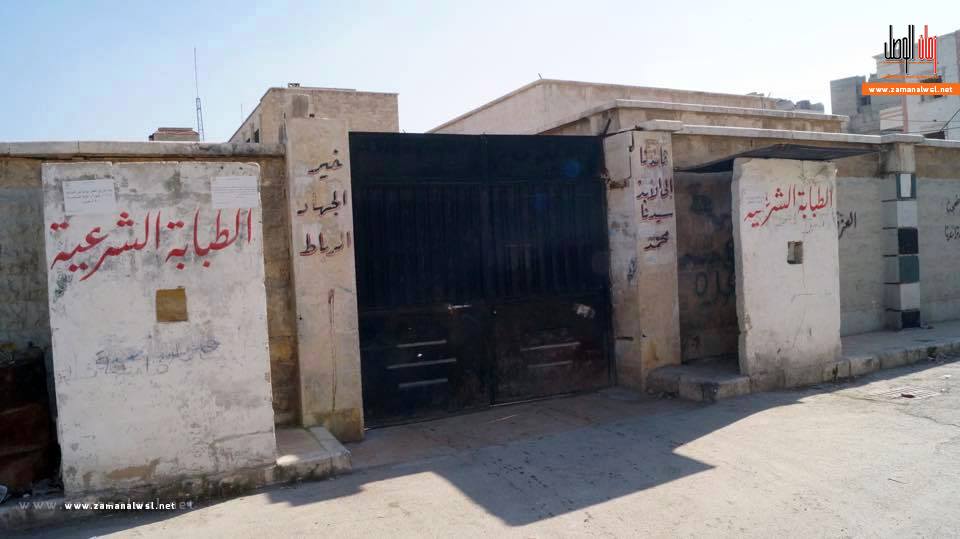(Translation by Yusra Ahmed)
Forensic Medicine centre in Aleppo provides many services in the liberated areas in the city of Aleppo especially for the investigations and criminal services, as many military and judicial bodies rely on them to determine the cause of death before issuing the "death certificate" which is mandatory before burying the dead legally in an official graveyard.
Dr. Mohammed Kahil, known as Abo Jaafer, a 50-year-old, certified crime expert manages the forensic Medicine centre in one of Aleppo’s neighborhoods. He used to work the same job before the revolution, the centre has 23 employees working under difficult circumstances.
In his talk to Zaman al-Wasl, Dr. Kahil explained that many difficulties are facing their work in forensic services since it was launched in 2013, specially lack of fund and support, even lack of equipments, where they sometimes use preliminary tools to reach to a result. He explained that they most employees work almost for free as volunteers because there was no money to give them their salaries.

Despite the lack of fund, the Forensic medicine centre began organizing courses in criminal evidence, to prepare and qualify new staff to cover other areas in the city and countryside. The service had earlier this month launched a course in forensic services and many activists attended.
The course was held in the Centre of Forensic Medicine in Aleppo, it aimed to improve the level of experience in criminal evidence, and other Forensic services. Dr. Kahil explained that most staff working police stations and security points are non-specialists in criminal or forensic fields and they need to develop their skills and raise the level of their knowledge and experience.
The Forensic Medicine section in Aleppo initiated new project to train the police dogs to help in finding criminal and forensic evidence, which might be difficult for human beings to find. It is the first project of its kind in the liberated areas of Syria.
Abo Jaafer added that project was started only short time ago, as they trained group of dogs to sniff drugs smell and discover their location or even to detect the smell of explosives to detect car bombs or suicide bombers. He hoped that would be of benefit amid lack of other equipments.
However, according to Dr. Kahil, carrying on with that project might be difficult, as each dog would need $200-300 monthly for food and medicine, which is over the budget. But he explained that he would try every possible attempt to implement that project because of its benefits for rebels and the revolution.
Forensic Medicine centre in Aleppo provides many services in the liberated areas in the city of Aleppo especially for the investigations and criminal services, as many military and judicial bodies rely on them to determine the cause of death before issuing the "death certificate" which is mandatory before burying the dead legally in an official graveyard.
Dr. Mohammed Kahil, known as Abo Jaafer, a 50-year-old, certified crime expert manages the forensic Medicine centre in one of Aleppo’s neighborhoods. He used to work the same job before the revolution, the centre has 23 employees working under difficult circumstances.
In his talk to Zaman al-Wasl, Dr. Kahil explained that many difficulties are facing their work in forensic services since it was launched in 2013, specially lack of fund and support, even lack of equipments, where they sometimes use preliminary tools to reach to a result. He explained that they most employees work almost for free as volunteers because there was no money to give them their salaries.

Despite the lack of fund, the Forensic medicine centre began organizing courses in criminal evidence, to prepare and qualify new staff to cover other areas in the city and countryside. The service had earlier this month launched a course in forensic services and many activists attended.
The course was held in the Centre of Forensic Medicine in Aleppo, it aimed to improve the level of experience in criminal evidence, and other Forensic services. Dr. Kahil explained that most staff working police stations and security points are non-specialists in criminal or forensic fields and they need to develop their skills and raise the level of their knowledge and experience.
The Forensic Medicine section in Aleppo initiated new project to train the police dogs to help in finding criminal and forensic evidence, which might be difficult for human beings to find. It is the first project of its kind in the liberated areas of Syria.
Abo Jaafer added that project was started only short time ago, as they trained group of dogs to sniff drugs smell and discover their location or even to detect the smell of explosives to detect car bombs or suicide bombers. He hoped that would be of benefit amid lack of other equipments.
However, according to Dr. Kahil, carrying on with that project might be difficult, as each dog would need $200-300 monthly for food and medicine, which is over the budget. But he explained that he would try every possible attempt to implement that project because of its benefits for rebels and the revolution.
Zaman Al Wasl
















Comments About This Article
Please fill the fields below.